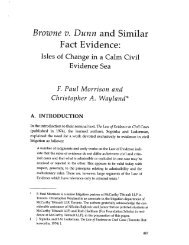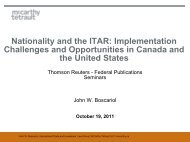The Doctrine of Public Policy in Canadian Contract Law
The Doctrine of Public Policy in Canadian Contract Law
The Doctrine of Public Policy in Canadian Contract Law
Create successful ePaper yourself
Turn your PDF publications into a flip-book with our unique Google optimized e-Paper software.
24 / Annual Review <strong>of</strong> Civil Litigation<br />
recently rejected the traditional common law position that cont<strong>in</strong>gency fee<br />
agreements were champertous,'2' not<strong>in</strong>g that public policy considerations relat<strong>in</strong>g<br />
to the adm<strong>in</strong>istration <strong>of</strong> justice had evolved to place a greater emphasis<br />
upon access to the courts than <strong>in</strong> the past. <strong>The</strong> Court stated that:<br />
Where can be no doubt that from a public policy standpo<strong>in</strong>t, the attitude towards<br />
permitt<strong>in</strong>g the use <strong>of</strong> cont<strong>in</strong>gency fee agreements has undergone enormous change<br />
over the last century. <strong>The</strong> reason for the change <strong>in</strong> attitude is directly tied to<br />
concerns about access to justice. Over time, the costs <strong>of</strong> litigation have risen<br />
significantly and the unfortunate result is that many <strong>in</strong>dividuals with meritorious<br />
claims are simply not able to pay for legal representation unless they are successful<br />
<strong>in</strong> the litigation.. . I am persuaded that the historic rationale for the absolute<br />
prohibition is no longer justified.' 22 [emphasis added]<br />
McIntyre thus represents an example <strong>of</strong> the courts reformulat<strong>in</strong>g the public<br />
policy doctr<strong>in</strong>e to respond to the impact <strong>of</strong> chang<strong>in</strong>g social conditions upon one<br />
<strong>of</strong> the doctr<strong>in</strong>e's underly<strong>in</strong>g concerns.'23<br />
4. <strong>Contract</strong>s Involv<strong>in</strong>g Immorality<br />
<strong>The</strong> category <strong>of</strong> public policy that is concerned with contracts <strong>in</strong>volv<strong>in</strong>g<br />
immorality is perhaps the most dynamic and theoretically <strong>in</strong>terest<strong>in</strong>g area <strong>of</strong><br />
the doctr<strong>in</strong>e's application.124 Although one writer has noted that "[a] perusal <strong>of</strong><br />
121 As noted <strong>in</strong> McIntyre, supra note 120 at para. 56, every other <strong>Canadian</strong> prov<strong>in</strong>ce and<br />
territory has enacted legislation or rules <strong>of</strong> court which alter this position and permitted<br />
the use <strong>of</strong> cont<strong>in</strong>gency fees. <strong>The</strong> Ontario legislature followed suit subsequent to McIntyre<br />
by amend<strong>in</strong>g the Solicitors Act, R.S.O. 1990, c. S.I5.<br />
122 McIntyre, supra note 120 at paras. 55 and 70.<br />
123 <strong>The</strong> Court <strong>in</strong> McIntyre, supra note 120 at paras. 71-73, was also careful to note that its<br />
decision was partly based upon the existence <strong>of</strong> a regulatory framework which it believed<br />
was sufficient to prevent abuses <strong>of</strong> process through lawyer-client cont<strong>in</strong>gency fee agreements.<br />
<strong>The</strong> absence <strong>of</strong> such a framework <strong>in</strong> the case <strong>of</strong> paralegals led the Court <strong>in</strong> Tri<br />
Level Claims Consultant Ltd. v. Kol<strong>in</strong>iotis (2005), (sub nom. Kol<strong>in</strong>iotis v. Tri Level<br />
Claims Consultant Ltd.) 201 O.A.C. 282, [2005] O.J. No. 3381 (C.A.) at paras. 23-33<br />
to hold that paralegal-client cont<strong>in</strong>gency fee agreements should rema<strong>in</strong> barred on the<br />
basis <strong>of</strong> the public policy doctr<strong>in</strong>e.<br />
124 <strong>The</strong> general proposition that a contract which is contrary to morality may be unenforceable<br />
was recognized <strong>in</strong> Jones v. Randall (1774), 1 Cowp. 17 at 37 (Eng. K. B.). <strong>The</strong><br />
idea that immoral behaviour is contrary to public policy has also been recognized <strong>in</strong><br />
conflict <strong>of</strong> laws jurisprudence, where the doctr<strong>in</strong>e is <strong>of</strong>ten <strong>in</strong>voked as a defence to the<br />
recognition and enforcement <strong>of</strong> foreign judgments: see Boardwalk Regency Corp. v.<br />
Maalouf (1992), 6 O.R. (3d) 737 (C.A.), additional reasons at (1992), 6 O.R. (3d) 737<br />
at 758 (C.A.); and Beals v. Saldanha, 2003 SCC 72 at paras. 71-77. However, it is<br />
unclear to what extent public policy <strong>in</strong> this context is dist<strong>in</strong>ct from the doctr<strong>in</strong>e <strong>of</strong> public<br />
policy <strong>in</strong> contract law. <strong>The</strong> <strong>Canadian</strong> conflict <strong>of</strong> laws conception <strong>of</strong> public policy appears<br />
to be <strong>in</strong>creas<strong>in</strong>gly fixated upon morality, <strong>of</strong>ten to the detriment <strong>of</strong> other categories <strong>of</strong><br />
public policy (such as restra<strong>in</strong>t <strong>of</strong> trade or prejudice to the adm<strong>in</strong>istration <strong>of</strong> justice)
















